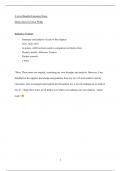Other
A* Dorian Gray A Level Revision Notes & Analysis
- Module
- Unit 2 - Prose
- Institution
- PEARSON (PEARSON)
A Level English Literature Notes: Dorian Gray by Oscar Wilde Indicative Content: - Summary and analysis of each of the chapters - AO1, AO2, AO3 - At points, AO4 has been noted in comparison to Dorian Gray - Themes, motifs, Allusions, Context - Further research - + more *Note: These note...
[Show more]



